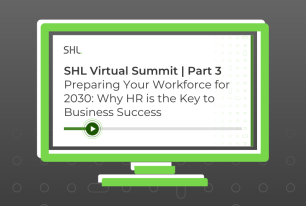Can Digital Transformation Enhance Our Human-centric Approach to Work?
The pandemic has accelerated digital transformation, yet many organizations have not reaped the rewards in terms of employee experience. SHL’s Lucy Beaumont discusses how leaders can use the change to improve our human-centric approach to work.
Share
I recently attended my first in-person conference post-pandemic—a real, live conference. With people, socializing and impromptu conversations about thought-provoking topics, I nostalgically remembered all the simple things that accompany a conference: the lanyard around your neck, the huge barrels of coffee, and those first tentative conversations that can lead to lifelong connections with others.
But this was an HR Tech conference, and I could not help but notice how technology was laced throughout. It seems that we are past the days of roaming microphones to pick up audience questions and are now using QR codes to post questions and vote on those of most interest. What an efficient way to manage this process, I thought. I then wondered what impact it had on audience participation and connection. Where lies the sweet spot between technology and human experience?
Therein lies the question that continued to surface not only at the conference but in many of the conversations I have with colleagues and clients around the world. We are at the crux of an intersection between rapid and radical digital transformation, and a global social movement towards a human-centric approach to work. McKinsey estimates that the pandemic accelerated digital transformation by seven years. HR tech continues to see billions of dollars of investment and a tripling of the market between 2020 and 2021. It also remains a top priority for CEOs with 68% planning a major investment in data and technology post-pandemic. And yet it can be argued that we are not reaping the rewards in terms of the employee experience. How far have we really come?
Digital transformation and employee experience
Let’s take an example. Many, if not all organizations have digitalized their expense claim process. Gone are the days of physical receipts stapled to an expense report; we now see automated systems designed to streamline this simple process for employees. Yet I wonder what your experience of submitting an expense claim is. Is it simple, straightforward, and quick? Or is it something that you put off and bury for another time? In their book Digital Talent, Matt Alder and Mervyn Dinnen found that employees not only perceive the expense reclaim process to be frustrating but actually believe that it has intentionally been designed to deter people from claiming back expenses. Sounds familiar right? But surely the intention was to improve the employee experience, not hinder it?
As HR embraces digital transformation, we have an opportunity to think intentionally about how we utilize technology to sit alongside and support people at work. There is no doubt that technology, data, and analytics can increase efficiencies, improve our ability to make informed decisions, and reduce the inherent bias that humans bring to the table. And yet there is also a risk that technology erodes some of the fundamental aspects of work that create the positive and engaging employee experience many organizations are striving to achieve.
As HR embraces digital transformation, we have an opportunity to think intentionally about how we utilize technology to sit alongside and support people at work.
It is therefore incumbent upon us to put employee experience at the forefront of decisions made around technology and digital transformation. To put ourselves in the shoes of our leaders, managers, and employees across the board. This is particularly relevant in talent management where we are striving to make organization-wide talent decisions that ultimately impact the lives of individuals. Technology, data, and analytics have a critical role to play in this field, but should be used to improve our decision-making, add value to our managers and feel valuable to individual employees.
So, what’s next?
As we all keep our eye on the tech landscape and try to anticipate the next big thing that is going to change the world of work, we might also want to step back. We might want to ask:
- ‘What are the aspects of work that technology can improve and add value to for our people?’
- ‘How can we use analytics to power objective, scientifically based decision making?’ and
- ‘What will the experience of this technology implementation be for our people?’
Then implement technology for employees, managers, and HR to support and enhance our people, teams, and organizations. When we do this effectively, I have seen firsthand how digital transformation really can enhance our human-centric approach to work. Reducing bias, enhancing Diversity, and improving talent decision-making, alongside creating a positive and engaging environment for individuals to develop themselves. The future is bright, the future is human.
Register for our demonstration webinar, and discover how SHL increases the accuracy and agility of talent management decisions.









